
JOIN US
GET OUR KUNEKUNE
NEWSLETTER
New and highly discounted products, fresh and hot stories & useful information
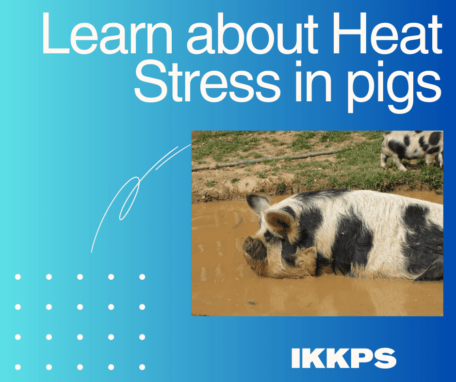
Learn more about a new app to help manage your herd.
Heat Stress in pigs
As temperatures rise, so does the risk of heat stress in pigs. This guide covers the causes, symptoms, and prevention methods to keep your pigs healthy.
Learn about a new app for preventing heat stress in your KuneKune herd that has just been released in the Apple Store and Google Play. Take advantage of all the tools at your fingertips. Learn more below about this new app and signs of Heat Stress in pigs.
Understanding Heat Stress in Pigs: Causes, Symptoms, and Prevention
Heat stress can be a significant issue for pigs, especially during sizzling summer months. It can lead to decreased feed intake, weight loss, and even death. As a pig owner, it's important to understand the causes and symptoms of heat stress, as well as how to prevent it from occurring in your herd.
What is heat stress in pigs?
Heat stress in pigs occurs when their body temperature rises above normal levels, and they are unable to cool down. This can happen when the temperature and humidity levels are high, or when pigs are exposed to direct sunlight for extended periods of time. When pigs are unable to regulate their body temperature, they may experience a range of symptoms, including panting, increased water consumption, decreased feed intake, and lethargy. If left untreated, heat stress can lead to more serious health issues and even death.
Unlike the saying " sweat like a pig", that is just a saying that pigs cannot sweat. They use mud puddles and kiddie pools to help regulate their body temperature in the summer months.
Causes of heat stress in pigs.
Heat stress in pigs can be caused by a variety of factors, including elevated temperatures and humidity levels, lack of ventilation, overcrowding, and exposure to direct sunlight for extended periods of time. Pigs are particularly susceptible to heat stress because they do not have sweat glands and rely on panting to regulate their body temperature or water sources such as mud puddles. Additionally, pigs with darker skin or thicker coats may be more prone to heat stress than those with lighter skin or thinner coats. As you know KuneKunes have more hair than most pig breeds and that is why it is such an important topic to know about. It’s important for pig farmers to monitor weather conditions and provide adequate ventilation and shade to prevent heat stress in their animals.
Symptoms of heat stress in pigs.
The symptoms of heat stress in pigs can vary depending on the severity of the condition. Mild cases may include increased panting, restlessness, and decreased feed intake. As the condition worsens, pigs may exhibit more severe symptoms such as lethargy, staggering, and even collapse. In extreme cases, heat stress can lead to death. It’s important for pig farmers to monitor their animals closely during hot weather and take action to prevent further complications.
Prevention methods for heat stress in pigs.
There are several prevention methods that pig farmers can implement to reduce the risk of heat stress in their animals. One of the most important is to provide adequate ventilation and cooling systems in pig housing areas. This can be as easy as installing a fan, opening windows in farrowing quarters, and providing kiddie pools and mud puddles. This can include misters, and sprinklers to help lower the temperature and humidity levels. It’s also important to provide access to
clean, cool water and to adjust feeding schedules to avoid feeding during the hottest parts of the day. Additionally, farmers should monitor their pigs closely for signs of heat stress and act immediately if symptoms are observed.
Importance of monitoring and addressing heat stress in pigs.
Heat stress can have grave consequences for pigs, including reduced growth rates, decreased reproductive performance, and even death. It’s important for pig farmers to monitor their animals closely during hot weather and take action to prevent and address heat stress. It is much easier to prevent the problem than to treat it once they have it. By taking these steps, farmers can help ensure the health and well-being of their pigs and maintain the productivity of their operations.
Tips for Shade for KuneKune pigs
It is extremely easy to create shade for your KuneKunes by fencing in part of the surrounding woods or purchasing Shade Cloths or sails. You can even get creative and build your own. Having the shaded area near your mud puddle is immensely helpful as well. Hanging shade cloths are as easy as putting in a couple of posts and using bungee cords to attach them. Shading the mud puddles will also help keep that water cooler.

Amazon sells many distinct types of shade cloths or sails
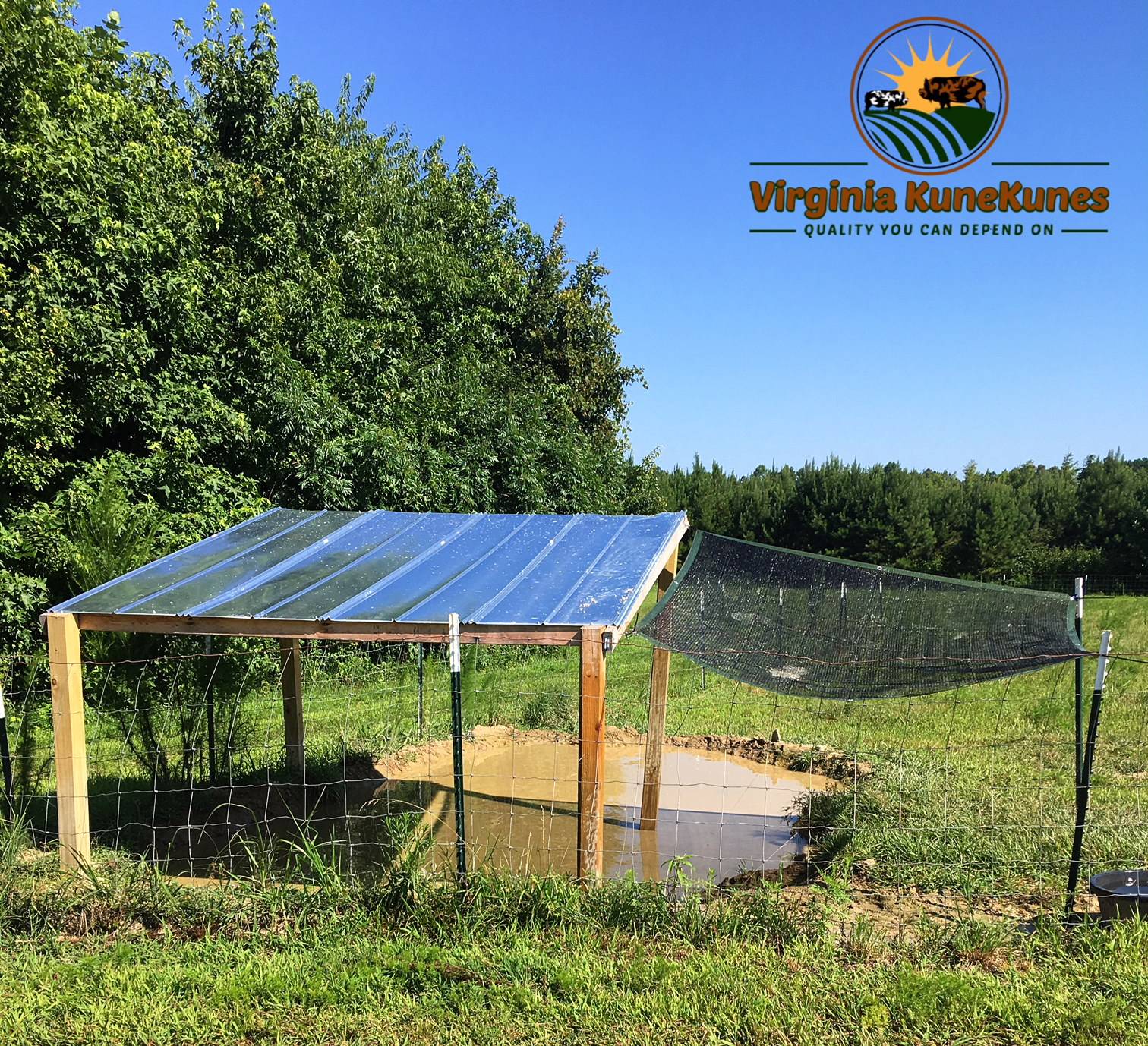
You can easily build shade structures for your pigs
Additional Related IKKPS Articles
Additional Related Outside References to learn more about Heat Stress
This is about Pigs in General and not just KuneKunes.
Watch a podcast by Dr. Jay Johnson, an animal scientist, to learn more in this informative video from thepigsite.com website.
USDA develops new heat stress app for pigs
Just announced is a tool to put into your toolbox for raising this incredible breed of swine called KuneKunes. USDA developed a new app that will help you with knowing when your herd is most likely to experience Heat Stress.
"Available in the Apple App Store and Google Play Store, HotHog taps into local weather data to predict the relative comfort or heat stress levels of pigs on an hourly, daily or weekly basis. Swine producers can then use this information to take pre-emptive measures, like ensuring plenty of drinking water, cooling the pigs with fans or mist, and limiting transport to early morning hours.
Annually, heat stress in pigs costs the US swine industry an estimated $481 million in revenue losses. Ensuring the positive welfare and productivity of pigs (a top source of animal protein worldwide) will be even more critical in the face of global climate change—particularly during the summer months and in tropical regions, noted Jay S. Johnson, an animal scientist who leads the ARS's Livestock Behaviour Research Unit in West Lafayette, Indiana." from thepigsite.com

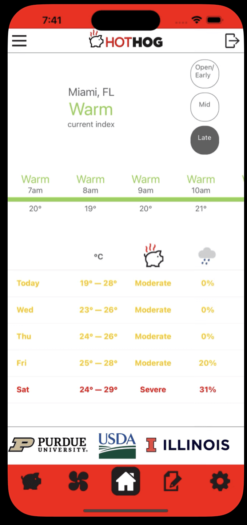
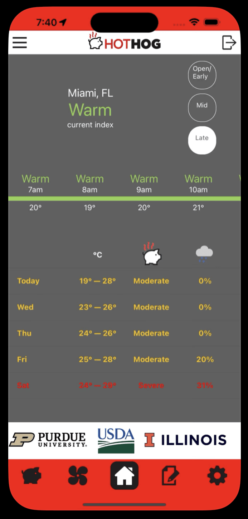
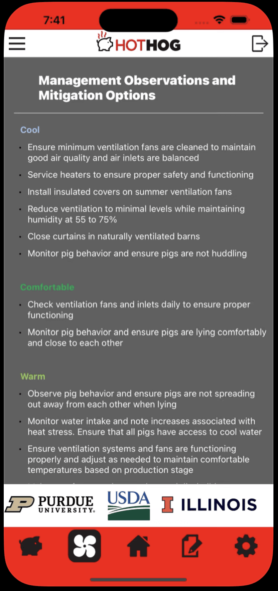
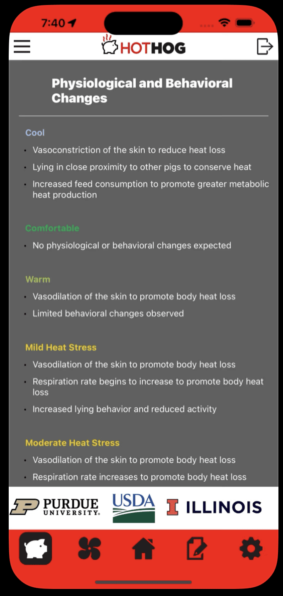
Registry Office
17500 Hamilton Arms Court Dewitt, VA 23840